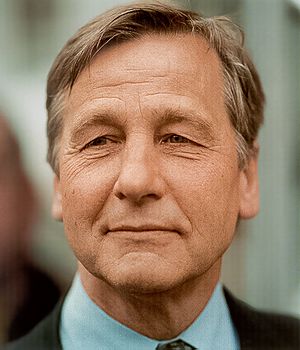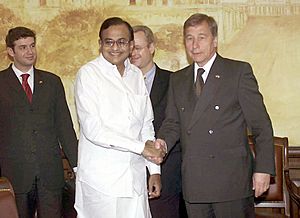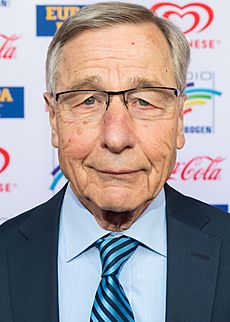Wolfgang Clement facts for kids
Quick facts for kids
Wolfgang Clement
Bundesminister a. D. Ministerpräsident a. D. MdL a. D.
|
|||||||||||||||||||||||
|---|---|---|---|---|---|---|---|---|---|---|---|---|---|---|---|---|---|---|---|---|---|---|---|

Clement in 2004
|
|||||||||||||||||||||||
| Minister for Economics and Labour | |||||||||||||||||||||||
| In office 22 October 2002 – 22 November 2005 |
|||||||||||||||||||||||
| Chancellor | Gerhard Schröder | ||||||||||||||||||||||
| Preceded by |
|
||||||||||||||||||||||
| Succeeded by |
|
||||||||||||||||||||||
| Minister-President of North Rhine-Westphalia | |||||||||||||||||||||||
| In office 27 May 1998 – 22 October 2002 |
|||||||||||||||||||||||
| Deputy | Michael Vesper | ||||||||||||||||||||||
| Preceded by | Johannes Rau | ||||||||||||||||||||||
| Succeeded by | Peer Steinbrück | ||||||||||||||||||||||
| Minister of Economy and medium-sized Businesses, Technology and Transportation of North Rhine-Westphalia | |||||||||||||||||||||||
| In office 17 July 1995 – 9 June 1998 |
|||||||||||||||||||||||
| Minister-President | Johannes Rau | ||||||||||||||||||||||
| Preceded by | Günther Einert (Economy, medium-sized Businesses and Technology) | ||||||||||||||||||||||
| Succeeded by | Bodo Hombach | ||||||||||||||||||||||
| Minister for Special Affairs and Chief of the State Chancellery of North Rhine-Westphalia | |||||||||||||||||||||||
| In office 12 June 1990 – 17 July 1995 |
|||||||||||||||||||||||
| Minister-President | Johannes Rau | ||||||||||||||||||||||
| Preceded by | Klaus Dieter Leister | ||||||||||||||||||||||
| Succeeded by | Rüdiger Frohn | ||||||||||||||||||||||
|
|||||||||||||||||||||||
| Personal details | |||||||||||||||||||||||
| Born | 7 July 1940 Bochum, Gau Westphalia-South, German Reich (now Germany) |
||||||||||||||||||||||
| Died | 27 September 2020 (aged 80) Bonn, Germany |
||||||||||||||||||||||
| Cause of death | Lung cancer | ||||||||||||||||||||||
| Political party | Independent | ||||||||||||||||||||||
| Other political affiliations |
Social Democratic Party (1970–2008) | ||||||||||||||||||||||
| Alma mater | University of Marburg | ||||||||||||||||||||||
Wolfgang Clement (born July 7, 1940 – died September 27, 2020) was an important German politician. He was a member of the Social Democratic Party (SPD) for many years.
He served as the leader of the state of North Rhine-Westphalia (called the Minister President) from 1998 to 2002. Later, he became a national minister, leading the Federal Ministry of Economics and Labour from 2002 to 2005.
Wolfgang Clement was well-known for helping to create the "Agenda 2010" reforms. These changes aimed to improve Germany's job market and economy in the early 2000s. Many people believe these reforms helped reduce unemployment and boosted Germany's economic growth.
Contents
Early Life and Education
Wolfgang Clement was born in Bochum, Germany, on July 7, 1940. His father was a bricklayer.
He finished high school, earning his Abitur (a German diploma that allows you to go to university), at the Graf-Engelbert-Schule in Bochum. After that, he trained to be a journalist at the Westfälische Rundschau newspaper in Dortmund.
In 1965, he completed a law degree at the University of Münster. This degree allowed him to teach.
Career in Journalism
After university, Clement worked as an assistant at the Institute for Trial Law at the University of Marburg.
In 1968, he returned to the Westfälische Rundschau newspaper. He started as a political editor, then became the head of the political department, and later the deputy editor-in-chief.
From 1986 to 1989, Clement was the editor-in-chief of another newspaper, the Hamburger Morgenpost. In 2004, he received an honorary doctorate from the Ruhr University in Bochum.
Political Journey
Wolfgang Clement began his political career in 1970 when he joined the Social Democratic Party of Germany (SPD). He remained a member until 2008.
From 1981 to 1986, he was a spokesperson for the SPD's national leadership. He also served as the deputy leader of the party's group in parliament for a short time.
In 1989, he became the head of the State Chancellery for North Rhine-Westphalia (NRW). This was a key role in the state government led by then-Minister President Johannes Rau.
After the state elections in 1990, he became the State Minister of Special Tasks for NRW. In 1995, he took on the role of State Minister of Economics and Small Business, Technology, and Transport.
Member of State Parliament (1993–2002)
Clement was a member of the State Parliament of North Rhine-Westphalia from 1993 to 2002. This meant he helped make laws for the state.
He was also part of the SPD's state leadership in North Rhine-Westphalia from 1994 to 2001. He became a member of the SPD's national leadership in 1995 and stayed there until he left the party in 2008.
Minister President of North Rhine-Westphalia (1998–2002)
On May 27, 1998, Wolfgang Clement was chosen to be the Minister President of North Rhine-Westphalia. This is like being the governor of a state. He took over from Johannes Rau.
When he started, the state had a lot of debt. Clement announced plans to cut costs and save money. He even reduced the number of ministers in his own government.
He tried to combine the Justice and Interior ministries, but this decision was later ruled against by a court. He briefly took on the role of Justice Minister himself before someone else was appointed.
During his time as Minister President, Clement also became the deputy chairman of the SPD in 1999. In the 2000 state elections, the SPD, under his leadership, still managed to form a government with the Green Party, even though they received slightly fewer votes.
Federal Minister of Economics and Labour (2002–2005)
After the 2002 national elections, Clement was part of the team that formed a new government with Chancellor Gerhard Schröder. He left his role as Minister President of North Rhine-Westphalia on October 21, 2002.
He was then appointed the Federal Minister of Economics and Labour. This was a new "super ministry" that combined the previous Economics and Labour ministries.
In this role, Clement and Chancellor Schröder introduced the "Agenda 2010" reforms. These were major changes aimed at improving the German economy and job market. They included programs like the "Hartz reforms," which changed rules about jobs and social benefits to encourage more employment.
These reforms were very important for Germany. Many people believe they helped reduce unemployment and led to years of economic growth. However, the reforms also caused some disagreements within the SPD party.
After the 2005 elections, Angela Merkel became Chancellor. Wolfgang Clement was replaced by Michael Glos on November 22, 2005.
In 2008, Clement decided to leave the SPD party. This happened after he made a public statement that went against the party's views. He later supported the Free Democratic Party, but he did not join them.
Life After Politics
After leaving politics, Wolfgang Clement took on various roles. In 2006, he helped settle a dispute over salary increases for construction workers in Germany. He did this again in 2018, helping workers and employers agree on a pay raise.
In 2007, he became a visiting professor at the University of Duisburg-Essen's NRW School of Governance.
In 2017, the German Health Minister appointed Clement to help Germany's bid to become the new headquarters for the European Medicines Agency (EMA). He was also an honorary member of the International Raoul Wallenberg Foundation.
He also served on the boards of several companies and non-profit organizations, including:
- Deutsche Wohnen AG (Supervisory Board)
- Citigroup (German Advisory Board)
- Wolters Kluwer Deutschland (Advisory Board)
- German Cancer Research Center (Advisory Council)
- Hertie School of Governance (Board of Trustees)
Personal Life
Wolfgang Clement married Karin in 1966. They had five daughters and thirteen granddaughters.
He passed away at his home in Bonn, Germany, on September 27, 2020, at the age of 80. He had been ill with lung cancer.
Many colleagues admired Clement's strong work ethic. Peer Steinbrück, who took over as Minister President of North Rhine-Westphalia after Clement, noted that Clement could work with "sensationally low need for sleep." He would work late into the night and be back at his desk early in the morning.
See also
 In Spanish: Wolfgang Clement para niños
In Spanish: Wolfgang Clement para niños
- Hartz plan
- Agenda 2010
 | Aaron Henry |
 | T. R. M. Howard |
 | Jesse Jackson |




